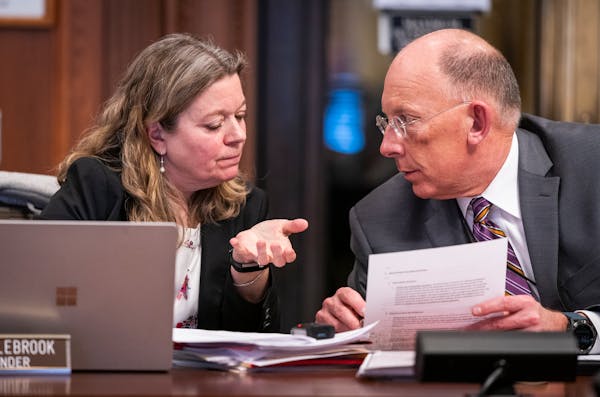Young offenders are primarily responsible for the wave of armed carjackings in Minneapolis, Mayor Jacob Frey and Deputy Police Chief Amelia Huffman said Thursday, laying out their response to one of the city's most violent years on record.
"We are seeing a tragic trend that has been unfolding especially among Minneapolis' youngest residents," Frey said at a news conference Thursday at Shiloh Temple in north Minneapolis.
Minneapolis has identified 39 people under the age of 18 who have three or more arrests, while 29 have five or more, he said. Repeat offenders are responsible for 75% of robbery arrests, including carjackings, and they need to be held accountable, the mayor said.
"Nobody here is suggesting that we're just going to arrest our way out of this problem, but if we fail to couple compassion with accountability — and that goes from the courts to the prosecutors, to police, to politicians — we are resigning ourselves to failed outcomes," he said.
Precinct inspectors, north Minneapolis faith leaders and community activists also attended.
Lynne Crockett, who ran for the Minneapolis school board last summer, asked why the justice system has failed to divert those youth from crime.
Huffman, who will take over as interim chief next month, said police needed to study the data behind their list of repeat arrestees "in each individual set of circumstances and identify what those meaningful interventions are going to be."
Frey said the city will try to quickly replace the one-third of officers lost to attrition over the last couple of years. In lieu of a fully staffed Police Department, he said the city will continue to rely on mutual-aid relationships with other law enforcement agencies.
"Our community has got to say, 'This behavior is not acceptable,' and start doing some stuff about it," said the Rev. Jerry McAfee. "We want to give it to law enforcement and then we move ahead and act like we don't have any responsibility. And I'm saying as a community, just as we want to hold you all accountable, we've got to hold ourselves accountable."
Minneapolis has 94 homicide victimsthis year, according to a Star Tribune database. Of victims whose race is known, about 77% are Black.
Minneapolis police data show 610 carjackings in 2021.
Additionally, 638 people were shot, which is up 176% from 234 in 2018 — Frey's first year as mayor.
Meanwhile, there were 644 sworn officers in the Minneapolis Police Department as of the pay period ending Dec. 4 after police resigned or took medical leave en masse following the murder of George Floyd.
This summer, a group of north Minneapolis residents won a police staffing lawsuit against the city. The District Court ordered the city to hire more officers by mid-2022 per the city charter, which states there must be a minimum number of officers based on population, or 730 officers according to the 2020 census.
The city is appealing that ruling.
Assistant City Attorney Gregory Sautter argued before the Court of Appeals on Wednesday morning that the City Council has fulfilled its duty to fund the police minimum, and the mayor has met his obligation of trying to fill those positions in good faith.
"The City Council passed a budget last week … [that] maximizes the amount of hiring that can happen and hopefully if it works, when we have enough interested candidates, we will bring in 190 new officers over the course of 2022, but there's no guarantee that's going to happen," Sautter said.
The judges on the appeals panel pressed Sautter repeatedly on whether it's true that the city charter requires only a minimum police force be funded, rather than actually filled.
"What the District Court did was they said that the charter does require this minimum," argued the Minneapolis residents' lawyer, James Dickey. "That's up to [the city's] discretion as to what they do as long as they comply with the minimums in the charter."
Staff writer Christina Saint Louis contributed to this report.

Want to share info with the Star Tribune? How to do it securely

'Safe recovery sites' would offer syringes, naloxone and more to people using drugs. The plan could be in peril.
New Minnesota GOP leaders seek peace with party's anti-establishment wing

Who is Republican Lisa Demuth, Minnesota's first House speaker of color?

